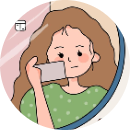I was glad to receive a gift from an old friend -I was glad that.......

Những câu hỏi liên quan
Điền vào mỗi chỗ trống trong những câu sau một động từ phù hợp về nghĩa và dạng đúng của động từ:1.I was glad a present from my old closest friend.2.I was relieved out that I had passed the exam.3.The jet pilot was very lucky alive after the plane crash.5.Sunny didn’t feel like going anywhere. She was content at home and a book.6.The teacher is always willing the students with difficult exercises7.The students a...
Đọc tiếp
Điền vào mỗi chỗ trống trong những câu sau một động từ phù hợp về nghĩa và dạng đúng của động từ:
1.I was glad a present from my old closest friend.
2.I was relieved out that I had passed the exam.
3.The jet pilot was very lucky alive after the plane crash.
5.Sunny didn’t feel like going anywhere. She was content at home and a book.
6.The teacher is always willing the students with difficult exercises
7.The students are motivated part in the English speaking comtest.
8.Jessica was hesitant home alone on the dark street.
1. to receive
2. to find
3. to be
5. to stay... read
6. to help
7. to take
8. to walk
Đúng 3
Bình luận (0)
Ai giúp mik với ạ! mình cảm ơn!Điền vào mỗi chỗ trống trong những câu sau một động từ phù hợp về nghĩa và dạng đúng của động từ:1.I was glad a present from my old closest friend.2.I was relieved out that I had passed the exam.3.The jet pilot was very lucky alive after the plane crash.5.Sunny didn’t feel like going anywhere. She was content at home and a book.6.The teacher is always willing the students with diff...
Đọc tiếp
Ai giúp mik với ạ! mình cảm ơn!
Điền vào mỗi chỗ trống trong những câu sau một động từ phù hợp về nghĩa và dạng đúng của động từ:
1.I was glad a present from my old closest friend.
2.I was relieved out that I had passed the exam.
3.The jet pilot was very lucky alive after the plane crash.
5.Sunny didn’t feel like going anywhere. She was content at home and a book.
6.The teacher is always willing the students with difficult exercises
7.The students are motivated part in the English speaking comtest.
8.Jessica was hesitant home alone on the dark street.
9. Iwas surprised Mr. Jay at the meeting.
10. We were very sorry the bad news about the collapse of the bridge.
điền vaò chỗ trống trong câu sau 1 động từ phù hợp về nghĩa và dạng đúng của từ đó :
i was glad ______ a present from my old close friend
Xem thêm câu trả lời
IV) Choose the underline word or phrase that needs correcting21. That (lovely) picture (was drew) (by) my (eight-years-old) brother A B C D22. Im glad (to hear) that you (speak) English (very) (good) A B C D23. Jane (promised) she (will drive) me (to the) station (the next day) A B C ...
Đọc tiếp
IV) Choose the underline word or phrase that needs correcting
21. That (lovely) picture (was drew) (by) my (eight-years-old) brother
A B C D
22. I'm glad (to hear) that you (speak) English (very) (good)
A B C D
23. Jane (promised) she (will drive) me (to the) station (the next day)
A B C D
24. (I'm) sorry i (really don't) know (where) (does she) live now
A B C D
25. He delayed (telling) her the (news), (waited) for the (right moment)
A B C D
1 B => was drawn
2 D => well
3 B => would drive
4 D => she lives
5 A => to tell
Đúng 1
Bình luận (1)
IV) Choose the underline word or phrase that needs correcting
21. That (lovely) picture (was drew) (by) my (eight-years-old) brother
A B C D
drew=>drawn
22. I'm glad (to hear) that you (speak) English (very) (good)
A B C D
good=>well
23. Jane (promised) she (will drive) me (to the) station (the next day)
A B C D
will=>would
24. (I'm) sorry i (really don't) know (where) (does she) live now
A B C D
does she live=>she lives
25. He delayed (telling) her the (news), (waited) for the (right moment)
A B C D
telling=>to tell
Đúng 1
Bình luận (0)
Xem thêm câu trả lời
Choose the best answer by circling its corresponding letter A, B, C or D. 1. I _________ to see Michael after so many years.A- glad was really B- was really glad C- was glad really D- really glad was2. There is _________ food left but not enough for everyone.A- little B- a little C- few D- a few3. The boy ………..on the beach asked me if I liked his kite. A- lie ...
Đọc tiếp
Choose the best answer by circling its corresponding letter A, B, C or D.
1. I _________ to see Michael after so many years.
A- glad was really B- was really glad C- was glad really D- really glad was
2. There is _________ food left but not enough for everyone.
A- little B- a little C- few D- a few
3. The boy ………..on the beach asked me if I liked his kite.
A- lie B- lay C- laid D- lying
4. And I’d like a ………...of cigarettes, too.
A- box B- packet C- jar D- case
5. Did you take enough money with you? – No, I needed ……...more than I thought I would.
A- much B- many C- any D- of
6. He worked hard __________he could pass the final exam.
A.so that B.in order to C. so as to D. as result
7.Let’s paint the house __________ . It will be much cheaper.
A. themselves B. ourselves C. myself D. yourself
8. Choose a correct reply of the following expression: “Do you want this one or that one?”
A- I’ll say it again for you. B- I don’t mind. You choose.
C- Never mind. It doesn’t matter. D- Yes? Can I help you?
9. I have forgotten _________ this machine. Can you show me how ?
A- how to operate B- to operate C- operating D- how operates
10. We saw the girls _________ football as we drove past the field.
A- play B- to playing C- to play D- playing
11. I’ve………...to Paris. I went there in March.
A- been B- gone C- just D- yet
12. We would like ………...to the president’s reception, but we weren’t.
A- having invited B- having been invited C- to have invited D- to have been invited
13. Wood is used ………...making desks and tables.
A- to B- in C- for D- into
14. Hoa was extremely ………...about the history of China.
A- knowledgeable B- knowledge
C- knowledgeability D- knowledgeably
15. They ………... at the train station at 2 o’clock yesterday.
A- got B- reached C- traveled D- arrived
1. B.
2. A.
3. D.
4. B.
5. A.
6. A.
7. B.
8. B.
9. A.
11. B
12.D
13. C
14. B
15. D
(bn cần cái này nữa ko?)
Đúng 0
Bình luận (0)
Write a letter to friend using the words belowa. I/ receive/ letter / yesterday…………..…………………………………………………………………………………b. I/ glad/ you / well. I/ fine / too…………..…………………………………………………………………………………c. I/ get/ school report / last week…………..…………………………………………………………………………………d. I/ good grades/ History and English / but/ Math/ result/ bad…………..…………………………………………………………………………………e. Teacher/ ask/ me/ improve / it/ next school year…………..…………………………………………………………………………………f. I/ look forward to / hear/ news/ soon…………..………...
Đọc tiếp
Write a letter to friend using the words below
a. I/ receive/ letter / yesterday
…………..…………………………………………………………………………………
b. I/ glad/ you / well. I/ fine / too
…………..…………………………………………………………………………………
c. I/ get/ school report / last week
…………..…………………………………………………………………………………
d. I/ good grades/ History and English / but/ Math/ result/ bad
…………..…………………………………………………………………………………
e. Teacher/ ask/ me/ improve / it/ next school year
…………..…………………………………………………………………………………
f. I/ look forward to / hear/ news/ soon
…………..…………………………………………………………………………………
Ai lm giúp mik vs ạ ...Mik đang cần gấp
Cảm ơn nhìu ạ
a. I received your letter yesterday.
b. I'm glad that you are well. I am fine, too.
c. I got my school report last week.
d. I got good grades in History and English but my Math result was bad.
e. The teacher asked me to improve it in the next school year.
f. I am looking forward to hearing news from you soon.
Đúng 3
Bình luận (0)
Exercise 2:. Find and correct the mistake in the following sentences. 1. Last Saturday I attended a party giving by one of my friends. My friend, who hasapartment is in another town, was very glad that I could come.2. Dr. Darnell was the only person to whom I wanted to see. 3. There are eighty students are from all over the world, study English at this school.4. The people who we met them on our trip last May are going to visit us on October.5. Dianne Jones that used to teach Spanish has orga...
Đọc tiếp
Exercise 2:. Find and correct the mistake in the following sentences.
1. Last Saturday I attended a party giving by one of my friends. My friend, who has
apartment is in another town, was very glad that I could come.
2. Dr. Darnell was the only person to whom I wanted to see.
3. There are eighty students are from all over the world, study English at this school.
4. The people who we met them on our trip last May are going to visit us on October.
5. Dianne Jones that used to teach Spanish has organized a tour of Central America
for senior citizens.
6. There is an old legend telling among people in my country about a man lived in
the seventeenth century saved a village from destruction.
7. I've met many people since I came here who some of them are from my country.
8. An old man was fishing next to me on the pier was muttering to himself.
9. People can speak English can be understood in many countries.
10. When I was a child. I was always afraid of the beggars whom they went from
house to house in my neighborhood.
11. One of the people which I admire most is my uncle.
12. Baseball is the only sport in which I am interested in it.
13. My favorite teacher, Mr. Peterson, he was always wiling to help me after class.
14. There are some people in the government who is trying to improve the lives of
poor people.
15. I have some good advice for anyone who he wants to leam a foreign language.
Exercise 2: Find and correct the mistake in the following sentences.
1. Last Saturday I attended a party giving by one of my friends. My friend, who has
apartment is in another town, was very glad that I could come.
giving => given
2. Dr. Darnell was the only person to whom I wanted to see.
to whom => whom
3. There are eighty students are from all over the world, study English at this school.
are from => from
4. The people we met them on our trip last May will visit us in October.
met them => met
5. Dianne Jones that used to teach Spanish has organized a tour of Central America
for senior citizens.
that => who
6. There is an old legend telling among people in my country about a man lived in
the seventeenth century saved a village from destruction.
telling => told
7. I've met many people since I came here who some of them are from my country.
who => X
8. An old man was fishing next to me on the pier was muttering to himself.
was => who was
9. People can speak English can be understood in many countries.
can => who can
10. When I was a child. I was always afraid of the beggars whom they went from
house to house in my neighborhood.
whom they => who
11. One of the people which I admire most is my uncle.
which => whom
12. Baseball is the only sport in which I am interested in it.
in which => which
13. My favorite teacher, Mr. Peterson, he was always wiling to help me after class.
he => who
14. There are some people in the government who is trying to improve the lives of
poor people.
is => are
15. I have some good advice for anyone who he wants to leam a foreign language.
he =>X
Đúng 3
Bình luận (0)
Exercise 2: Find and correct the mistake in the following sentences.
1. Last Saturday I attended a party giving by one of my friends. My friend, who has
apartment is in another town, was very glad that I could come.
giving => given
2. Dr. Darnell was the only person to whom I wanted to see.
to whom => whom
3. There are eighty students are from all over the world, study English at this school.
are from => from
4. The people we met them on our trip last May will visit us in October.
met them => met
5. Dianne Jones that used to teach Spanish has organized a tour of Central America
for senior citizens.
that => who
6. There is an old legend telling among people in my country about a man lived in
the seventeenth century saved a village from destruction.
telling => told
7. I've met many people since I came here who some of them are from my country.
who => X
8. An old man was fishing next to me on the pier was muttering to himself.
was => who was
9. People can speak English can be understood in many countries.
can => who can
10. When I was a child. I was always afraid of the beggars whom they went from
house to house in my neighborhood.
whom they => who
11. One of the people which I admire most is my uncle.
which => whom
12. Baseball is the only sport in which I am interested in it.
in which => which
13. My favorite teacher, Mr. Peterson, he was always wiling to help me after class.
he => who
14. There are some people in the government who is trying to improve the lives of
poor people.
is => are
15. I have some good advice for anyone who he wants to leam a foreign language.
he =>X
Đúng 0
Bình luận (3)
Listen and read. Ms Hoa: Good moming, class. There was an education fair last weekend. Did anyone go?Nam: Yes, Mai and I did. The fair was great, and we got a lot of useful information.Ms Hoa: Im glad to hear that. Would you like to share some of it with the class?Mai: Sure. After finishing school, we mainly have two education options. For example, we can get into university if we earn high grades or pass the university entrance exam.Nam: Thats true, but academic education isn’t everything. Th...
Đọc tiếp
Listen and read.
Ms Hoa: Good moming, class. There was an education fair last weekend. Did anyone go?
Nam: Yes, Mai and I did. The fair was great, and we got a lot of useful information.
Ms Hoa: I'm glad to hear that. Would you like to share some of it with the class?
Mai: Sure. After finishing school, we mainly have two education options. For example, we can get into university if we earn high grades or pass the university entrance exam.
Nam: That's true, but academic education isn’t everything. The other option is going to a vocational school where we can learn skills for particular jobs.
Ms Hoa: That sounds interesting. So what are your plans for the future?
Mai: I'm hoping to go to university. Having won several biology competitions, I want to study biology and become a scientist.
Ms Hoa: Great! It’s really important to follow your dream, Mai.
Mai: My mum still regrets not having gone to university. So I want to make her proud of me. How about you, Nam?
Nam: Well, I don’t think university is for me. I want to go to a vocational school because I want to become a car mechanic. My father owns a car repair shop. Having watched him work very hard for many years helped me make my decision.
Ms Hoa: That's very sensible, Nam! I hope you can help him grow his business.
Cô Hoa: Chúc cả lớp vui vẻ. Có một hội chợ giáo dục vào cuối tuần trước. Có ai đi không?
Nam: Vâng, Mai và tôi đã làm. Hội chợ thật tuyệt vời và chúng tôi đã nhận được rất nhiều thông tin hữu ích.
Cô Hoa: Tôi rất vui khi nghe điều đó. Bạn có muốn chia sẻ một số điều đó với cả lớp không?
Mai: Chắc chắn rồi. Sau khi học xong, chúng tôi chủ yếu có hai lựa chọn giáo dục. Ví dụ, chúng ta có thể vào đại học nếu chúng ta đạt điểm cao hoặc vượt qua kỳ thi tuyển sinh đại học.
Nam: Đúng vậy, nhưng giáo dục học thuật không phải là tất cả. Lựa chọn khác là đến một trường dạy nghề, nơi chúng ta có thể học các kỹ năng cho những công việc cụ thể.
Cô Hoa: Nghe thú vị đấy. Vì vậy, kế hoạch của bạn cho tương lai là gì?
Mai: Tôi hy vọng được vào đại học. Giành chiến thắng trong một số cuộc thi sinh học, tôi muốn học sinh học và trở thành một nhà khoa học.
Cô Hoa: Tuyệt vời! Điều thực sự quan trọng là theo đuổi giấc mơ của bạn, Mai.
Mai: Mẹ tôi vẫn tiếc vì đã không học đại học. Vì vậy, tôi muốn làm cho cô ấy tự hào về tôi. Còn bạn thì sao Nam?
Nam: Chà, tôi không nghĩ đại học là dành cho tôi. Tôi muốn học trường dạy nghề vì tôi muốn trở thành thợ sửa xe. Bố tôi sở hữu một cửa hàng sửa chữa ô tô. Chứng kiến anh ấy làm việc rất chăm chỉ trong nhiều năm đã giúp tôi đưa ra quyết định của mình.
Cô Hoa: Hay lắm đấy Nam! Tôi hy vọng bạn có thể giúp anh ấy phát triển công việc kinh doanh của mình.
Đúng 1
Bình luận (0)
Mark the letter A, B, C or D to indicate the sentences which is closest in meaning to the given one.31 . The woman said to her son,”I am glad I am here.” A. The woman told her son I was glad I was there. B. The woman told her son she was glad I was there. C. The woman told her son she was glad she was there. D. The woman told to her son she was glad she was there.32.How long are you going to stay?. Susan asked George ……………………….. A...
Đọc tiếp
Mark the letter A, B, C or D to indicate the sentences which is closest in meaning to the given one.
31 . The woman said to her son,”I am glad I am here.”
A. The woman told her son I was glad I was there.
B. The woman told her son she was glad I was there.
C. The woman told her son she was glad she was there.
D. The woman told to her son she was glad she was there.
32."How long are you going to stay?". Susan asked George ………………………..
A. how long he was going to stay. B. that how long he has gone to stay.
C. how long he is going to stay. D. how long was he going to stay.
33. “Don’t forget to do your homework”, the teacher told us.
A. The teacher told us do not forget to do our homework.
B. The teacher told us to not forget to do our homework.
C. The teacher reminded us to do our homework.
D. The teacher reminded us not to forget to do your homework.
34. Jane hasn’t played the piano since 2005.
A. The last time Jane played the piano in 2005
B The last time Jane played the piano was 2005.
C. Jane last played the piano was 2005.
D. Jane has played the piano in 2005
35. My brother began studying English five years ago.
A. My brother began studying English for five years.
B. My brother has studied English for five years ago.
C. My brother has studied English for five years
D. My brother has begun studying English for five years.
Read the following passage and mark the letter A, B, C or D to indicate the correct answer to each of the questions from 36 to 40
Every year students in many countries learn English. Some of these students are young children. Others are teenagers. Many are adults. Some learn at school, others study by themselves. A few learn English just by hearing the language in film, on television in the office, or among their friends. But not many are lucky enough to do that. Most people must work hard to learn another language.
Learning another language! Learning English! Why do all these people want to learn English? It is not difficult to answer that question. Many boys and girls learn English at school because it is one of their subjects. They study their own language, and Math... and English. (In England, or America, or Australia, many boys and girls study their own language which is English, and Math,... and another language perhaps French, or German, or Spanish.)
Many adults learn English because it is useful for their work. Teenagers often learn English for their studies, because some of their books are in English at the college or university. Other people learn English because they want to read newspapers or magazines in English.
36. According to the writer, ________
A. only adults learn English. B. no children like learning English.
C. English is only useful to teenagers. D. English is popular in much of the world.
37. Many people learn English by________.
A. watching videos only. B. hearing the language in the office.
C. talking with the film stars. D. working hard on their lessons.
38. Many boys and girls learn English because ________.
A. English can give them a job. B. it is included in their study course.
C. their parents make them. D. they have to study their own language.
39. In America or Australia many schoolchildren study ________.
A. English as a foreign language
B. English and Math only.
C. such foreign languages as French, German, and Spanish.
D. their own language and no foreign language.
40. Many adults learn English because ________.
A. their work is useful. B. they want to go abroad.
C. most of their books are in English. D. it helps them in their work.
Mark the letter A, B, C or D to indicate the sentences which is closest in meaning to the given one.
31 . The woman said to her son,”I am glad I am here.”
A. The woman told her son I was glad I was there.
B. The woman told her son she was glad I was there.
C. The woman told her son she was glad she was there.
D. The woman told to her son she was glad she was there.
32."How long are you going to stay?". Susan asked George ………………………..
A. how long he was going to stay. B. that how long he has gone to stay.
C. how long he is going to stay. D. how long was he going to stay.
33. “Don’t forget to do your homework”, the teacher told us.
A. The teacher told us do not forget to do our homework.
B. The teacher told us to not forget to do our homework.
C. The teacher reminded us to do our homework.
D. The teacher reminded us not to forget to do your homework.
34. Jane hasn’t played the piano since 2005.
A. The last time Jane played the piano in 2005
B The last time Jane played the piano was 2005.
C. Jane last played the piano was 2005.
D. Jane has played the piano in 2005
35. My brother began studying English five years ago.
A. My brother began studying English for five years.
B. My brother has studied English for five years ago.
C. My brother has studied English for five years
D. My brother has begun studying English for five years.
Read the following passage and mark the letter A, B, C or D to indicate the correct answer to each of the questions from 36 to 40
Every year students in many countries learn English. Some of these students are young children. Others are teenagers. Many are adults. Some learn at school, others study by themselves. A few learn English just by hearing the language in film, on television in the office, or among their friends. But not many are lucky enough to do that. Most people must work hard to learn another language.
Learning another language! Learning English! Why do all these people want to learn English? It is not difficult to answer that question. Many boys and girls learn English at school because it is one of their subjects. They study their own language, and Math... and English. (In England, or America, or Australia, many boys and girls study their own language which is English, and Math,... and another language perhaps French, or German, or Spanish.)
Many adults learn English because it is useful for their work. Teenagers often learn English for their studies, because some of their books are in English at the college or university. Other people learn English because they want to read newspapers or magazines in English.
36. According to the writer, ________
A. only adults learn English. B. no children like learning English.
C. English is only useful to teenagers. D. English is popular in much of the world.
37. Many people learn English by________.
A. watching videos only. B. hearing the language in the office.
C. talking with the film stars. D. working hard on their lessons.
38. Many boys and girls learn English because ________.
A. English can give them a job. B. it is included in their study course.
C. their parents make them. D. they have to study their own language.
39. In America or Australia many schoolchildren study ________.
A. English as a foreign language
B. English and Math only.
C. such foreign languages as French, German, and Spanish.
D. their own language and no foreign language.
40. Many adults learn English because ________.
A. their work is useful. B. they want to go abroad.
C. most of their books are in English. D. it helps them in their work.
Đúng 1
Bình luận (0)






























